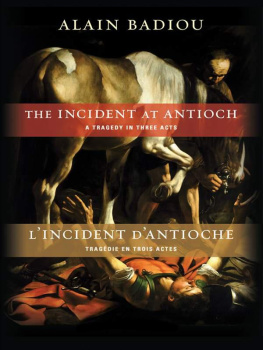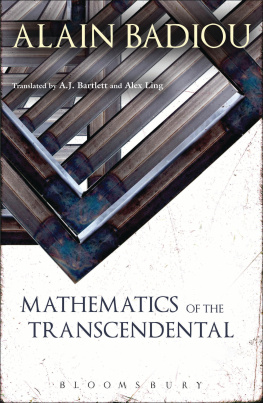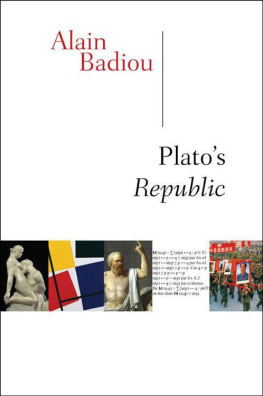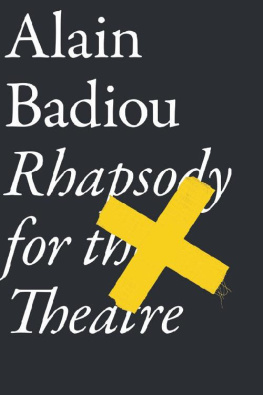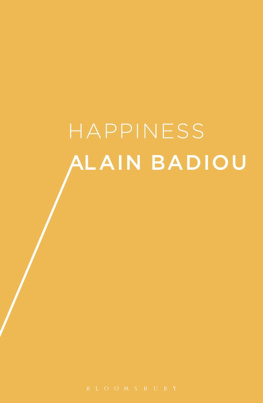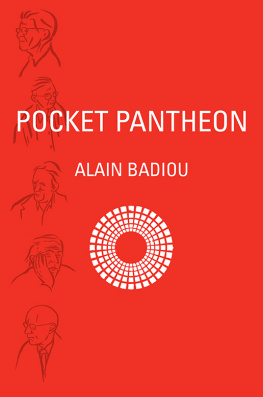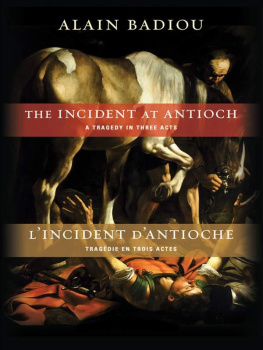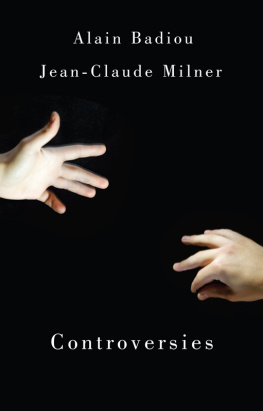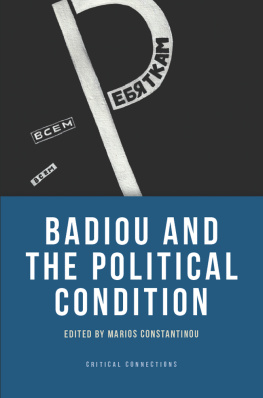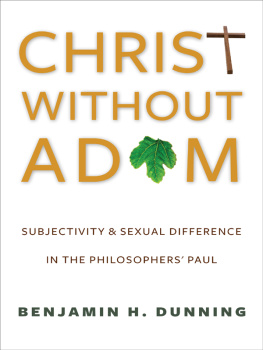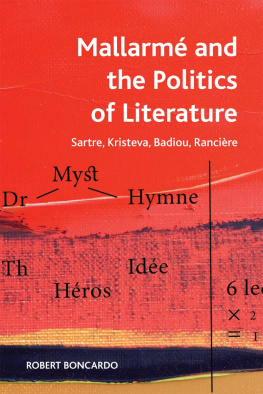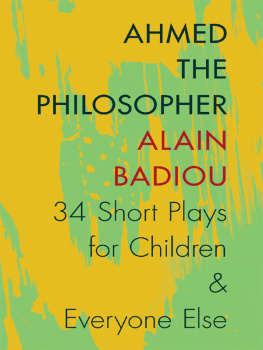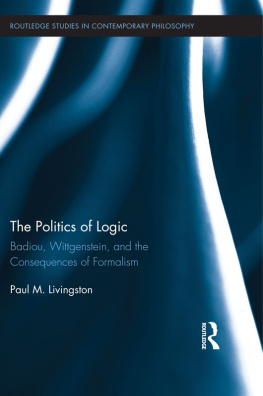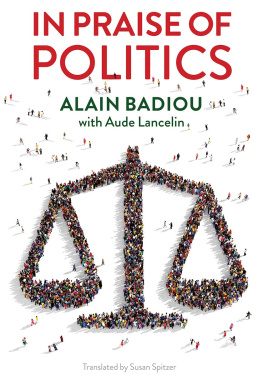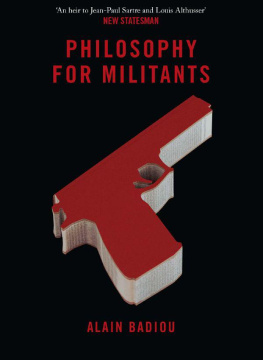THE INCIDENT AT ANTIOCH
LINCIDENT DANTIOCHE
INSURRECTIONS: CRITICAL STUDIES IN RELIGION, POLITICS, AND CULTURE
INSURRECTIONS: CRITICAL STUDIES
IN RELIGION, POLITICS, AND CULTURE
Slavoj iek, Clayton Crockett, Creston Davis, Jeffrey W. Robbins, Editors
The intersection of religion, politics, and culture is one of the most discussed areas in theory today. It also has the deepest and most wide-ranging impact on the world. Insurrections: Critical Studies in Religion, Politics, and Culture will bring the tools of philosophy and critical theory to the political implications of the religious turn. The series will address a range of religious traditions and political viewpoints in the United States, Europe, and other parts of the world. Without advocating any specific religious or theological stance, the series aims nonetheless to be faithful to the radical emancipatory potential of religion.
After the Death of God , John D. Caputo and Gianni Vattimo, edited by Jeffrey W. Robbins
The Politics of Postsecular Religion: Mourning Secular Futures , Ananda Abeysekara
Nietzsche and Levinas: After the Death of a Certain God, edited by Jill Stauffer and Bettina Bergo
Strange Wonder: The Closure of Metaphysics and the Opening of Awe , Mary-Jane Rubenstein
Religion and the Specter of the West: Sikhism, India, Postcoloniality, and the Politics of Translation , Arvind Mandair
Plasticity at the Dusk of Writing: Dialectic, Destruction, Deconstruction , Catherine Malabou
Anatheism: Returning to God After God , Richard Kearney
Rage and Time: A Psychopolitical Investigation , Peter Sloterdijk
Radical Political Theology: Religion and Politics After Liberalism , Clayton Crockett
Radical Democracy and Political Theology , Jeffrey W. Robbins
Hegel and the Infinite: Religion, Politics, and Dialectic , edited by Slavoj iek, Clayton Crockett, and Creston Davis
What Does a Jew Want? On Binationalism and Other Specters , Udi Aloni
A Radical Philosophy of Saint Paul, Stanislas Breton , edited by Ward Blanton, translated by Joseph N. Ballan
Hermeneutic Communism: From Heidegger to Marx , Gianni Vattimo and Santiago Zabala
Deleuze Beyond Badiou: Ontology, Multiplicity, and Event , Clayton Crockett
Self and Emotional Life: Merging Philosophy, Psychoanalysis, and Neuroscience , Adrian Johnston and Catherine Malabou
Alain Badiou
THE INCIDENT AT ANTIOCH
LINCIDENT DANTIOCHE
A Tragedy in Three Acts / Tragdie en trois actes
Introduction by Kenneth Reinhard
Translated by Susan Spitzer
COLUMBIA UNIVERSITY PRESS
NEW YORK
COLUMBIA UNIVERSITY PRESS
Publishers Since 1893
New York Chichester, West Sussex
cup.columbia.edu
Copyright 2013 Columbia University Press
All rights reserved
E-ISBN 978-0-231-52773-6
Library of Congress Cataloging-in-Publication Data
Badiou, Alain.
The incident at Antioch : a tragedy in three acts = Lincident dantioche : tragdie en trois actes / Alain Badiou; introduction by Kenneth Reinhard; translated by Susan Spitzer.First worldwide edition.
pages cm.(Insurrections: critical studies in religion, politics, and culture)
In English and French.
Includes bibliographical references.
ISBN 978-0-231-15774-2 (cloth : alk. paper)ISBN 978-0-231-15775-9 (pbk. : alk. paper)ISBN 978-0-231-52773-6 (ebook)
I. Spitzer, Susan, translator. II. Badiou, Alain. Incident dantioche. English. III. Badiou, Alain. Incident dantioche. IV. Title. V. Title: Incident at Antioch.
PQ2662.A323I5313 2013
842.914dc23
A Columbia University Press E-book.
CUP would be pleased to hear about your reading experience with this e-book at .
Cover image : Caravaggio, Conversion on the Way to Damascus , 1601.
Cerasei Chapel, Santa Maria del Popolo, Rome.
Cover design: Noah Arlow
Book design: Lisa Hamm
References to Internet Web sites (URLs) were accurate at the time of writing. Neither the author nor Columbia University Press is responsible for URLs that may have expired or changed since the manuscript was prepared.
CONTENTS
A Discussion of and Around
The Incident at Antioch
I began writing the first version of this playa tragedyduring the summer of 1982, in the atmosphere of solitude that surrounded me and my activist friends at the time owing to our firm opposition, right from the start, to the government of Franois Mitterrand (elected in 1981), to which everyone around us had eagerly rallied. Between 1972 and 1977, I had already written a long play entitled L charpe rouge (The Red Scarf). I had called it a romanopra (novelopera) because, in terms of both its length and its texture, it was more like a novel than a play, and because it was divided into arias, recitatives, ariosos, choruses, and so on. It was, moreover, as an opera that, after its publication by the illustrious ditions Maspero in 1979, it was given its first performance at the Opra de Lyon in 1984 and performed again, at the Festival dAvignon, and ultimately in Paris, at the Thtre National de Chaillot. Georges Aperghis wrote the music for it and Antoine Vitez directed.
I reworked The Incident at Antioch during the summer of 1984 at the same time as I was writing my first comedy, Ahmed le subtil (Ahmed the Subtle). I felt that the plot needed to be streamlined and especially that the chorus, which was very large in the first version, with many different voices, should be scaled down to more reasonable proportions.
Finally, between 1987 and 1989, I wrote a third version, the one that is being published here. This time around, the aim was to cut out all the too explicit references to the French political situation, to reduce the use of Marxist jargon, and to push the play toward a new form of universality, even if it were at the price of greater obscurity, or a more highly charged lyricism.
As can be seen, for about fifteen yearswhen I was between 35 and 50, say, and involved day and night in revolutionary politicstheater had nonetheless never been far from my thoughts.
After the staging of L charpe rouge I thought that Vitez, the brilliant man of the theater, would someday or other be interested in the other two plays. And, sure enough, he gave two memorable readings of them, one ( Ahmed ) at Chaillot and the other ( The Incident ) at the Thtre National Populaire in Villeurbanne. A few months after that second reading, he died suddenly, leaving all of us deeply bereaved. I put my plays away in a drawer and didnt even attempt to get them published. Theater disappeared from my writing and my concerns. It wasnt until 1993 that my interest in it revived, when Christian Schiaretti, the director of the Thtre de Reims at that time, discovered the text of Ahmed le subtil and decided to stage it. It was thanks to him that I found my way back to the Festival dAvignon and rediscovered my taste for writing for the theater again. Between 1994 and 1997I was approaching 60 at the timeI wrote three new plays, all centering around the character of Ahmed: Ahmed philosophe (Ahmed the Philosopher), Ahmed se fche (Ahmed Gets Angry), and Les Citrouilles (The Pumpkins). All these plays were published. They were also all performed, in several different productions, and are still being performed.

